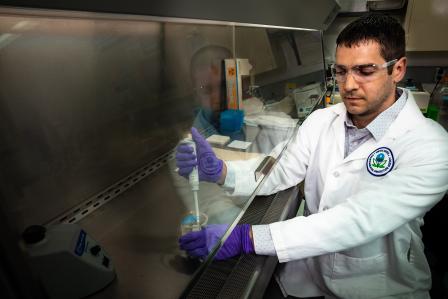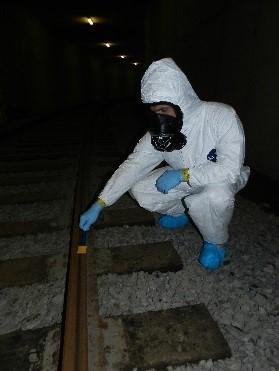Meet EPA Researcher Stuart Willison, Ph.D.
 Meet EPA researcher Stuart Willison!EPA researcher Stuart Willison characterizes chemical contamination for a wide range of chemicals, including chemical warfare agents and unregulated chemicals.
Meet EPA researcher Stuart Willison!EPA researcher Stuart Willison characterizes chemical contamination for a wide range of chemicals, including chemical warfare agents and unregulated chemicals.
How does your science matter?
I feel lucky that I’m able to provide the science that can assist EPA and others in responding to and recovering from chemical contamination incidents. My research supports decisions that are made during the characterization and remediation phases of chemical contamination incidents. It’s nice to see our hard work result in science that can be applied to real-world problems and be a part of real-world solutions.
Tell us more about the work you do.
My work involves characterizing chemical contamination including a wide range of chemicals, from Chemical Warfare Agents to unregulated chemicals. My research primarily focuses on developing surface wipe analytical methods and assessing chemical sampling methods for use during homeland security incidents.
What do you like most about your research?
Working within the applied science realm is certainly nice because the research can go from bench-scale to real-world applications. More specifically, working within the emergency response community has led to some fascinating technical support incident cases and rewarding outcomes.
When did you first know you wanted to be a scientist?
The best laid plans often occur by accident or chance. I was uncertain of what I wanted to do while I was in college. I changed my major several times and it wasn’t until a professor asked if I’d be interested in joining his lab to do undergraduate research that I realized I wanted to be a scientist. I was able to interact with graduate students and see the hard work that goes into research projects. I liked the problem-solving aspect of research and from there, I was hooked.
 Tell us about your background.
Tell us about your background.
I was born and raised in Lancaster, Ohio. I was fortunate to have the opportunity to participate in collegiate athletics at the University of Cincinnati, where I studied Chemistry. I met and competed with Olympic swimmers and set school records in swimming during my career which, with the help of scholarships, paid my way through college. I decided to continue research at UC (Go Bearcats) and obtained my Ph.D. in chemistry.
Any advice for students considering a career in science or engineering?
Like I tell my kids, you should at least try everything once. You’ll never know if you’ll like it unless you try. If you don’t like it, that’s fine, but at least you’ll know. More importantly, if you do end up liking the choice you made, you’ll be glad you took the chance to try something different. You’ll never know what the possibilities will be or what you could discover unless you’re willing to give it a chance.
What do you think the biggest scientific challenge is facing us in the next 20/50/100 years?
We must continue to innovate and push scientific boundaries. We can’t accept the status quo of today and assume it will be good enough for tomorrow. We must continue to pursue progress without the possibility of immediate results or impact. That’s not always how science works. Medical breakthroughs, environmental sustainability and preservation, or ingenuity that changes our lives typically doesn’t happen overnight and takes years of hard work. All too often we concern ourselves with the now, and live in the present, but we need to also think about the future. Will we be prepared for the next pandemic, next disaster (natural or man-made), or will we only concern ourselves with the present? We shouldn’t limit ourselves with the concept of something being good enough when there’s a possibility of something being better.
If you weren’t a scientist what would you be doing?
I’d like to think that I could be an inventor. I’m constantly looking to improve upon old inventions or come up with new ideas.
If you could have any super power what would it be?
To have unlimited health/longevity and wisdom. That’s more than one, but that’s my answer. Life is so fragile, and you never know when it will end. To have wisdom, share that wisdom, and live long enough to provide it to others would be great. Yes, I want to live forever!
If you could have dinner with any scientist, past or present, who would you choose?
It’s hard to choose one, but the current person would be Nikola Tesla because he was constantly thinking of new ideas and inventing new things. He worked with many famous scientists, like Thomas Edison. He had an eidetic memory and spoke many languages. No one really knows how many inventions he really had because he kept most of them to himself and didn’t file patents for all of his ideas. It would be interesting to have dinner with him and learn about the inventions that we never had the chance to learn about, and since he had an eidetic memory, he would remember all of them. Many other scientists have used his work and earned the Nobel Prize for themselves, yet sadly, he never received such accolades.
Editor's Note: The opinions expressed herein are those of the researcher alone. EPA does not endorse the opinions or positions expressed.
